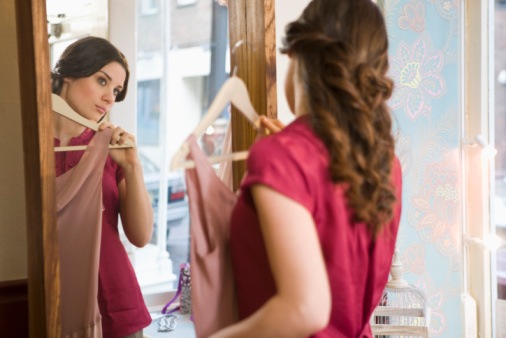We all want to feel desired. But whose validation matters most? Our own? Or a man’s?
These days, I spend a lot of time writing about valuing my body for what it can do instead of what it looks like, about how body ideals are less monolithic in practice than we think, and about how appearance should reflect your values, not those projected on billboards around you.
I didn’t always think that way. The intellectual and emotional journey that brought me here (and that I hope continues to evolve) began for me where it begins for many girls: in search of male validation.
I was a reasonably confident teenager, thanks in large part to sports and books, but I still spent most of my adolescence assuming that if and when men wanted to date me, it would be in spite of my figure, not because of it. I was a chunky, thick-thighed tomboy and although I managed to avoid the body shame that ravages the psyches of many an adolescent, I was aware that my body wasn’t what the boys were calling “banging.”
When I rolled into Chicago for my first week of college, I assumed I’d meet some brainy nerds who’d tolerate my chub in exchange for me tolerating their scrawny biceps. I was planning for body compromise, not body love. Yet within my first semester two experiences opened my eyes to possibilities I hadn’t let myself imagine. Looking back, neither passes the feminist sniff test, but what can I say; I was young and still figuring my shit out.
Picture it. It’s early September and I’m rushing across campus in a black peacoat, jeans, and sneakers. As I walk along the quad, I hear a honk from a passing SUV. A young black man leans out the window, “Girl,” he yells, “Do you know what you got back there?” I stop abruptly, was he talking to me? “A black man’s heaven!” He hoots, and they roar off.
Me? For real? This had never happened to me before. I couldn’t decide what was more novel, the catcalling or the idea that my butt might be desirable. Mind you, this is pre-Kardashian.
I grew up in the burbs. Catcalling wasn’t a thing, unless it was my dentist or the local librarian yelling out a car window to tell me to say hi to mother. 2014 Emily would appreciate neither the “girl,” nor the implication that my body is a “thing” that I’ve “got” for someone else to use. Freshman-in-college-Emily, on the other hand, felt the warm glow of a new compliment.
As for my butt, if it was, as this individual seemed to think it was, a “black man’s heaven,” this was news to me, probably because there were no black people in my town. Aha! I thought to myself, maybe in the City of Big Shoulders, I will have better luck with men! Perhaps men here will appreciate what I’ve got going on! Black men, white men, I could have cared less; the novelty of body compliments aimed in my direction was too exciting to ignore.
And then, like a cherry on top of the compliment cake, I got my first boyfriend. Not just any boyfriend, but a boyfriend who made it very clear that no compromises were being made at the expense of my jeans size. Early in our relationship, he showed me a bulletin board of index cards he and his group of co-ed friends had made one drunken evening. Each card listed the dimensions of their dream dates, from inseam to cup size. Super classy, I know. But lo and behold, my new boyfriend’s preferred dimensions happened to be exactly the ones I was sporting.
I have to emphasize again how novel that feeling was. Even though I wasn’t the girl with the eating disorder, or the girl who spent hours at the gym, or the one who pasted aspirational magazine pages to the refrigerator, I still wanted to hear that my body was desired. Even though I wasn’t the one who prayed for a smaller waist, or hid in tent-like T-shirts, or was too embarrassed to be seen on the beach, it was nice to know that at least someone thought I was the ideal. I didn’t even know I was looking for male validation until it landed in my lap, and when it did, I was grateful.
This week has seen a few high profile pieces about who we look to for bodily approval and what audience we’re really trying to please. At Salon, Tracy Flory-Clark wrote about the mismatch between what men claim to find beautiful and what women try to look like. At The Atlantic, Olga Khazan wrote about how women wear more make-up than necessary, mistakenly thinking it attracts men. The central assumption in both pieces is that women are obviously always trying to fit themselves into a mold that men will want.
As I graduated from that boyfriend to others, and the warm fuzzies from a catcall morphed into a deep resentment that strangers would dare comment on my body, I have tried to make sure my decisions are for me, and that male approval is just a perk, not the reason for being. I look the way I look because it is the mishmash of my parents’ genes, the haircut I choose because it suits my lifestyle, the make-up I don’t wear because it doesn’t bring me joy.
Some men are into all of that, and I love them for it. Some aren’t, and for them, well, I really don’t have the time.
Role Reboot regular contributor Emily Heist Moss is a New Englander in love with Chicago, where she works in a tech start-up. She blogs every day about gender, media, politics and sex at Rosie Says, and has written for Jezebel, The Frisky, The Huffington Post and The Good Men Project. Find her on Facebook and Twitter.
Related Links:

